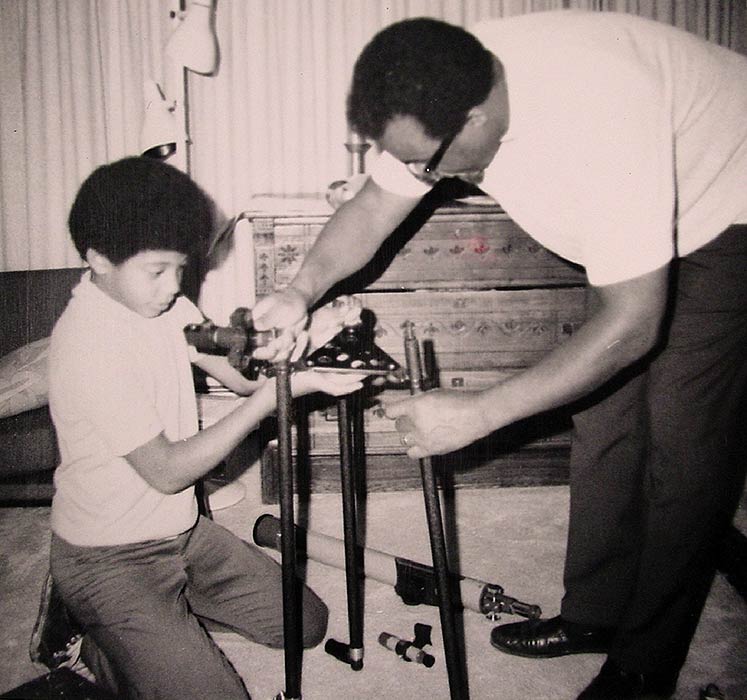Repass Remarks, based on a eulogy delivered to friends and family Holy Trinity Catholic Church, New York City.
Excerpted from Letters From An Astrophysicist, page 235

Dear Dad,
Thank you for a lifetime of wisdom you’ve bestowed upon me, drawn from moments, circumstances, and incidences in your life. With your permission, I’ll share a few that for me, rise above all others.
I’ve never forgotten the story of your high school gym teacher, who highlighted your body-type as one that would not make a good runner in the track and field unit of class. Your reaction? “Nobody is going to tell me what I cannot do with my life.” You immediately took up running. You also ran in Hitler’s Berlin Stadium for the 1946 “GI Olympics.” The post-war world was not yet ready for a traditional Olympics, so this special event contested soldier-athletes of the various theaters of conflict around the world. And by college you became world class in middle distance races, at one time capturing the fifth fastest time in the world for the 600-yard run. Drawing upon that example for inspiration, I have overcome the most negative societal forces on my life’s ambitions.
I’ve never forgotten the story of your best friend Johnny Johnson, also a track star, competing in a meet against the New York Athletic Club. In the day, they of course admitted only WASPs, so athletic Blacks or Jews instead competed as teammates for the Pioneer Club, founded for that purpose. As Johnny came around the last turn in the quarter mile, he was ahead of the New York Athletic Club runner by several strides when he overheard the fellow’s coach audibly yell to his runner, “Catch that nigger!” Johnny’s reply to himself was simple and direct, “This is one nigger he ain’t gonna catch!” and lengthened his lead to the finish line. What today might be called micro-aggressions, back then were parlayed into forces of inspiration to excel. From that example, I’ve used such occasions in my life to excel beyond even the expectations I hold for myself.
You told of immigrant Grandma’s work as a seamstress. Grandpa’s work as night watchman for the food service company Horn & Hardart. A good thing, because he would occasionally bring home leftover food when the money was tight. Your stories of strife were never hate-filled. Never bitter. Instead, they were hope-filled and inspirational—conveyed with tentative confidence that the arc of social justice will continue to bend towards righteousness. I carry that vision for society’s future into every day of my life.
You studied hard in school, and took your interest in social justice all the way to your appointment as Mayor Lindsey’s Commissioner of New York City’s Human Resources Administration. Journalists don’t write articles about news that does not happen. But the programs you enabled in the inner city, empowering the youth during the powder-keg years of the late 1960s, ensured that any unrest or disturbance would be mild. Sure enough, New York was calm compared with what went down in Watts, Newark, Detroit, Cincinnati, Milwaukee, and especially in Chicago, Washington, DC and Baltimore, for which Federal troops were called to quell the violence. You worked behind the scenes on this, with your only reward the quiet knowledge that the nation’s largest city did not burn during the most turbulent years of the most turbulent decade in American history since the Civil War. Striving to do what is right, without regard to who takes notice, should be a model for us all.
Your stories and perspectives about navigating the people, politics, funding streams, and legacies of institutions deeply informed my (successful) efforts to create, from whole cloth, a brand new Department of Astrophysics at the American Museum of Natural History. You taught me that in life, it’s not good enough to be right. You also must be effective. For that, I now count the formation of that department as one of the highest achievements of my professional career.
So Dad, this “thank you” letter in death is simply public notice of what I’ve already thanked you for in life: bestowing upon me guiding principles for living my life to the fullest, and along the way, when possible, lessening the suffering of others.
I know I will miss you, because I already do.
Cyril deGrasse: October 1927–December 2016

